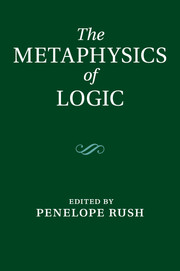Book contents
- The Metaphysics of Logic
- The Metaphysics of Logic
- Copyright page
- Dedication
- Contents
- Contributors
- Introduction
- Part I The Main Positions
- Chapter 1 Logical realism
- Chapter 2 A defense of logical conventionalism
- Chapter 3 Pluralism, relativism, and objectivity
- Chapter 4 Logic, mathematics, and conceptual structuralism
- Chapter 5 A Second Philosophy of logic
- Chapter 6 Logical nihilism
- Chapter 7 Wittgenstein and the covert Platonism of mathematical logic
- Part II History and Authors
- Part III Specific Issues
- References
- Index
Chapter 6 - Logical nihilism
from Part I - The Main Positions
Published online by Cambridge University Press: 05 October 2014
- The Metaphysics of Logic
- The Metaphysics of Logic
- Copyright page
- Dedication
- Contents
- Contributors
- Introduction
- Part I The Main Positions
- Chapter 1 Logical realism
- Chapter 2 A defense of logical conventionalism
- Chapter 3 Pluralism, relativism, and objectivity
- Chapter 4 Logic, mathematics, and conceptual structuralism
- Chapter 5 A Second Philosophy of logic
- Chapter 6 Logical nihilism
- Chapter 7 Wittgenstein and the covert Platonism of mathematical logic
- Part II History and Authors
- Part III Specific Issues
- References
- Index
Summary
Keywords
- Type
- Chapter
- Information
- The Metaphysics of Logic , pp. 109 - 127Publisher: Cambridge University PressPrint publication year: 2014
- 2
- Cited by

